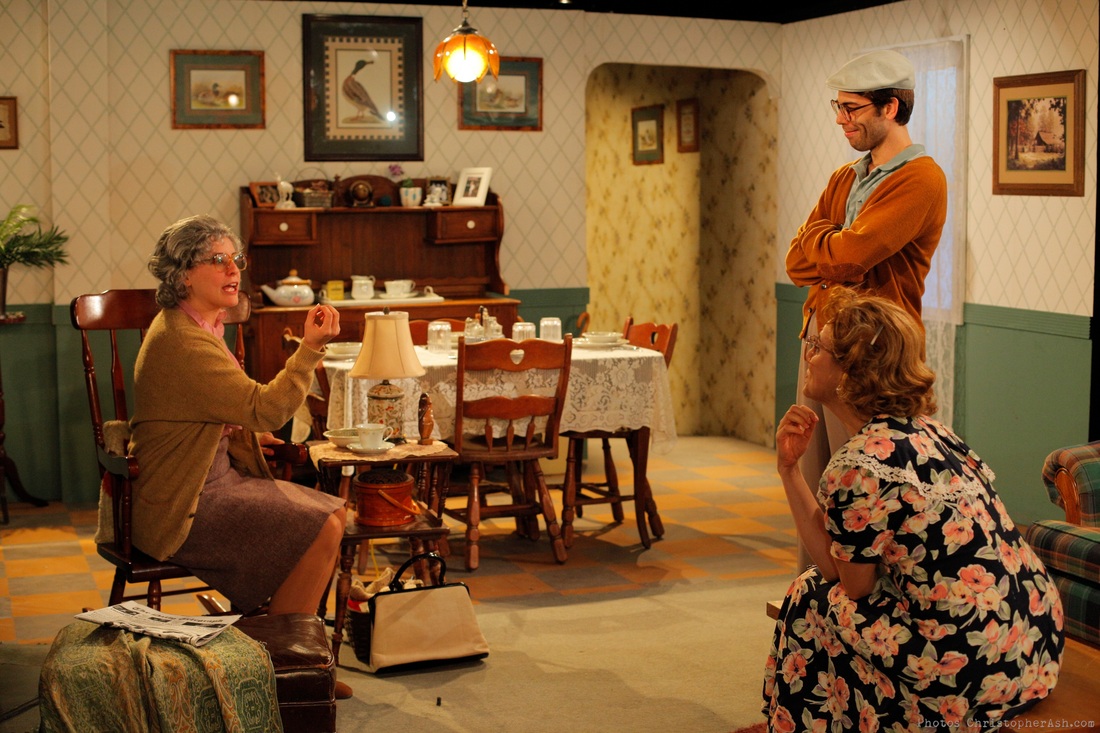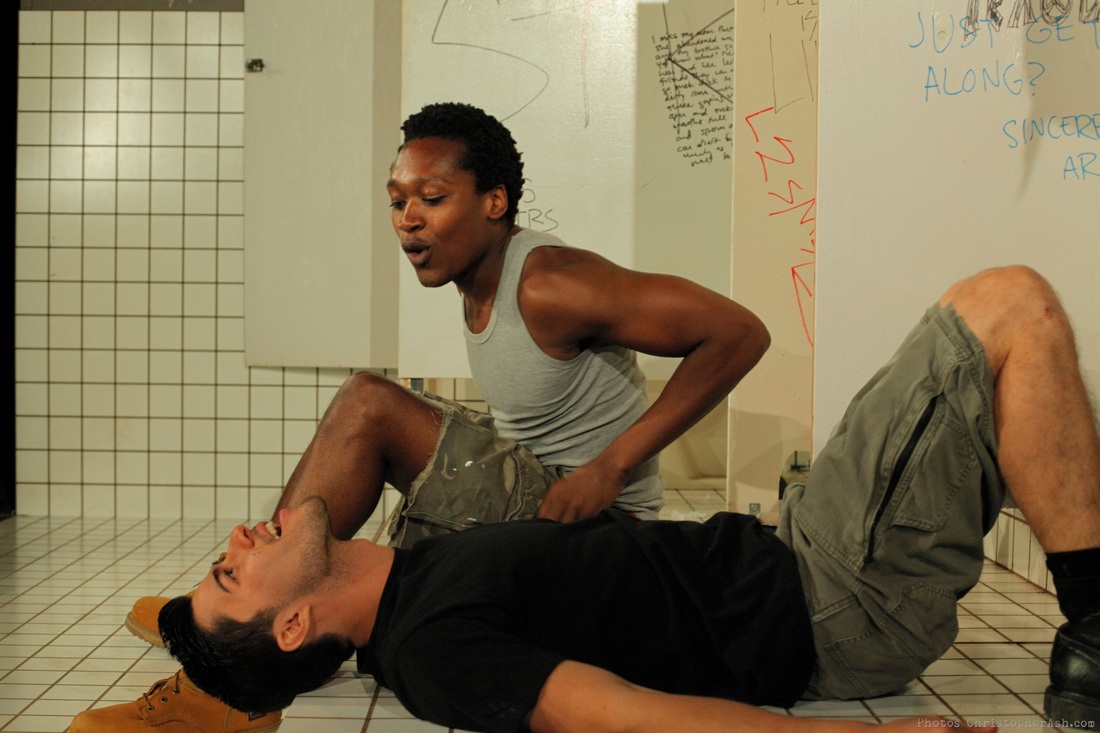The final show in the Yale Summer Cabaret’s “Summer of Giants” combines two plays by contemporary British playwright Caryl Churchill—Heart’s Desire and Drunk Enough to Say I Love You—into an evening of theater that ends the eleven-week season not with a bang, not with a whimper, but with a feisty kick-in-the-pants. Churchill, as evidenced by these two plays at least, is that rarest of creatures, an absurd satirist—or is that a satirical absurdist? Heart’s Desire tends more toward the absurd while not completely satirizing the affections of the sitcom lives on view; Drunk Enough tends more toward satire of the make-you-bleed variety, poking sore spots and squeezing out pus with a caustic twinkle in the eye. And don’t forget that both these plays are, at bottom, love stories. As directed by Dustin Wills—who recently received a Princess Grace Award for his final year of study next year—these plays confront the audience with highly theatrical experiences that reflect in significant ways upon the quality of modern life. Churchill leaves naturalism behind in favor of stylized and mannered presentations, commenting not only on the resources of comic theater but on the kinds of empathy we naturally bring to the theater-going experience.
Heart’s Desire takes us into the heart of a family gathered in a sentimental-looking sitting room—very middle-class Brit—where Brian (Chris Bannow), the father, Alice (Ceci Fernandez), the mother, and Maisie (Michelle McGregor), the aunt, are awaiting the return of twenty-five-year-old Susy (Celeste Arias) from Australia. The “backstory” seems to be that Susy’s return marks the end of her first significant departure from the family nest, and so there are feelings of anticipation and apprehension attendant upon her arrival. If this were a play from the “kitchen-sink” era of Brit drama, we’d have lots of honest emotion about how this couple is coping with the recognition that their little girl is grown and all they have now is their marriage, in whatever tattered form it now exists. That play—the naturalistic side of Heart's Desire—is all about the tedium of waiting and the minor revelations that occur when people look forward too much, depending on others to both share a feeling while masking it, swallowing up the momentous in the everyday.
But Churchill isn’t that kind of playwright, so, while she nimbly gives us enough to sink our teeth into, so to speak, she also keeps pulling the carpet out from under this little domestic drama through a variety of skillful, and manic, techniques: carefully manipulated repetitions that underline the tenuous tightrope we walk in our “scripted” dealings with others; fast-forwards that cast life as memory even while its happening; visual non sequiturs that wrench us from the norm with farce, fantasy, horror—as for instance when masked figures enact a quick and darkly comic home invasion, or when a pantomime ostrich suddenly shows up for no apparent reason; and subplots and alternate “takes” that let us glimpse roads not taken and possible spin-offs, as when the family begins to muse about forensics and a body found in the garden, or when the son, Lewis (Mamoudou Athie), bursts in as a punk prole one moment, or a fidgety nerd the next, or a drunken lout (all ostensibly the same character).
Through it all, the main trio hit the same marks again and again, following the same script until it veers off-course, then resets. Sometimes we’re back to the moment before Brian’s entrance, sometimes we’re back to when he begins to get edgy (“you’ve spoilt it!”), sometimes we’re back to when he finally calls his wife “a nasty woman” right before the bell rings to announce their darling’s arrival. In each repetition something new is revealed if only the odd hopscotch logic by which we navigate through what we say and what we feel, and what we acknowledge from others.
As Brian, Chris Bannow is marvelous. I won’t soon forget the manic glee of his speech about letting his mouth gobble up his entire body, bit by bit. It’s either an instance of complete insanity or a deliberate “comic turn” on Brian’s part, and there’s no way to say for certain. Likewise, Michelle McGregor’s Maisie can, one moment, dither on about the attractions of the platypus like someone a bit “dotty,” and at another deliver an affecting rumination on the emotional perils of departure and seeing people off. While, as Alice, Ceci Fernandez maintains that infernal “brightness” so familiar from almost any role Emma Thompson has assayed (“be nice to her, that’s all!”), giving us a tour de force turn as a kind of emotional wind-up toy—now caustic, now gleeful, now imploring, now detached. In a summer of great ensemble work, the paces Wills puts his three main actors through here hits a high point.
The support is also fun—Athie’s comic intrusions and a brief scene with Prema Cruz as a special friend who suddenly shows up in Susy’s stead extend the situation into other possibilities—but in the end every extraneous element only more relentlessly concentrates our attention on the “no exit” space of this couple picking at each other’s scabs. Tensions are brought to high relief by the return of the absent one whose absence makes her more present than ever, and whose imminent presence heightens how abject this home is without her.
Consider Kate Noll’s set in its vivid use of middling detail. Quite marvelous. Now stay through intermission to see it transformed into a seedy lavatory, complete with urinals, graffiti, and a coffee maker. Both sets are wonderfully realized, with Drunk Enough creating a space entirely determined by Wills and his technicians as Churchill gives no guidance about where the play should be set nor how played. Once you realize that, you can only be rather awed by the pas de deux of seduction, sexual interaction, hurt feelings, lovers’ tiffs, and boastful braggadocio that takes place between Sam (Ato Blankson-Wood), “a country,” and Guy (Mitchell Winter), “a man.”
About that “a country”: Sam and Guy speak almost entirely in the terms of U.S. acts of aggression and/or geopolitical dominance. It’s an ideological courtship, we could say, with Sam setting the terms by which Guy must show his love. This includes simulated fellatio, simulated anal sex, and shooting up heroin and snorting coke and, while we might expect Sam to be “the top,” Wills makes Sam play the rather demanding “bottom.” In other words, the sexual politics of this staging rub against—in provocative ways—its geopolitics. The script is almost a history lesson of U.S. foreign policy, but always delivered as half-formed and half-finished statements between two lovers trying to stay on the same page.
Blankson-Wood is suitably mercurial as Sam, at times domineering, at times sneering, at times yielding, at times truly hurt—as in the aftermath of the dreaded phrase “the Towers!” As Guy, Winter has the difficult task of remaining reactive (which isn't the same as reactionary), pulled this way and that by his importunate lover’s demands (for world dominance with good PR). Later in the play Guy starts to question Sam, hitting “below the belt” with questions about environmental effects and a wasteful lifestyle that receive petulant replies that amount to “anyone would do the same thing who could” and, perhaps, a rift not so easy to overcome. Could it be the end of the American century?
The Yale Summer Cabaret has lived up to its ambition this year, giving us two great classics—Tartuffe and Miss Julie—in lively and, in the latter especially, memorable productions, as well as two lesser-known plays by masters—Lorca and Williams respectively—that, while not great plays, were given treatments by the cast, directors and tech that were truly inspired, ending with two challenging plays that confirm the unique strength of small-scale, intimate theater and adventurous choices.
Heart’s Desire and Drunk Enough to Say I Love You By Caryl Churchill Directed by Dustin Wills
Stage Manager: Geoff Boronda; Scenic Designer: Kate Noll; Costume Designer: Seth Bodie; Lighting Designer: Oliver Wason; Sound Designer: Rob Chikar; Projection Designer: James Lanius; Puppet Designer: Dustin Wills; Production Manager/Technical Director: James Lanius; Assistant Technical Director: Joey Moro
Photographs by Christopher Ash, courtesy of Yale Summer Cabaret
Yale Summer Cabaret August 8-August 18, 2013






